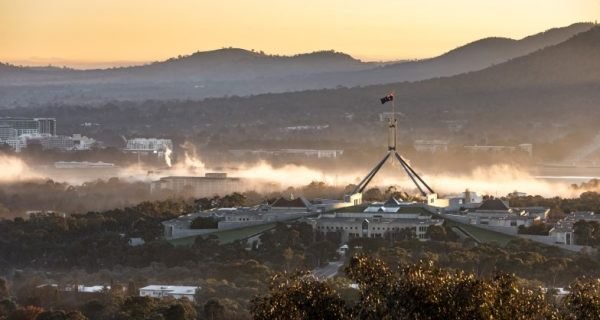Search
Democracy Links
Member's Off-site Blogs
a smoking ruin ...

/* Style Definitions */ table.MsoNormalTable {mso-style-name:"Table Normal"; mso-tstyle-rowband-size:0; mso-tstyle-colband-size:0; mso-style-noshow:yes; mso-style-priority:99; mso-style-parent:""; mso-padding-alt:0cm 5.4pt 0cm 5.4pt; mso-para-margin:0cm; mso-para-margin-bottom:.0001pt; mso-pagination:widow-orphan; font-size:11.0pt; font-family:"Arial",sans-serif; mso-bidi-font-family:"Times New Roman"; mso-bidi-theme-font:minor-bidi; mso-fareast-language:EN-US;}
It’s now a statement of the obvious that Australia’s political system has evolved into dysfunctionality. We used to be one of the world’s most successful democracies. Now we’re an international laughing stock. We may not have produced a Trump, but we’ve produced a less personalised versions of the same thing, chaos. So now we’re all scrambling to explain why.
I recently published a book, The Mess We’re In, trying to explain why democratic politics is so terrible. My main worry while bashing it out last year was that the mess would resolve itself, that my view that it was an unprecedented period created by long-term forces would prove to be wrong because things would sort themselves out.
Yeah, nah, turns out I needn’t have worried.
So here’s a quick sketch of why I think we have just gone through the most disastrous leadership crisis yet.
The collapse of neoliberalism
I bang on and on about this but it is fundamental: our economic system stopped working in the interests of voters and only delivers benefits for corporations and the rich. The five years of wage stagnation we’ve endured while banks and energy companies stole billions in profits starkly demonstrated that. And the electorate has had a gutful. The result: even a government that has delivered some of the strongest jobs growth in Australian history lost dozens of polls in a row.
Tony Abbott witnessed the start of this disaffection; his failure to see the ground shifting under him in the toxic reaction to the 2014 budget was part of his downfall. Turnbull initially thought he could solve the problem by being Keating Redux and leading a new era of intelligent neoliberal reform. It took him less than a year, and a near-defeat in 2016, to make him change. But he could only do so in fits and starts and reactively, pushing for company tax cuts while intervening in the energy market and reluctantly allowing a banking royal commission.
It’s unlikely that any leader could have addressed the deeply entrenched disenchantment with our economic paradigm. Turnbull had a go, but failed, and thus was doomed to always struggle with poor polls.
Our political system isn’t trusted by voters
The level of support for minor parties is on the rise. So are other forms of resistance by citizens to politics-as-usual — non-registration, refusal to vote, voting early. Across the West, and here, something broke in terms of democratic participation after the Iraq war, for which no leader was ever held accountable.
Here, there isn’t even a federal anti-corruption and misconduct body to police politicians and public servants. There’s little transparency: FOI laws, donation disclosure laws and diary laws are weak or non-existent. And our political class is increasingly composed of careerists whose job is politics, meaning they make decisions influenced by their own career needs as much as perceptions of the public interest.
But this isolated, unaccountable and non-transparent system has become self-perpetuating: we force people to vote, we force them to preference so that their votes flow back to the major parties, we fund parties for each vote they get. Politics-as-usual can continue without being affected by voter disenchantment.
The internet has wrecked public debate
The internet is rewiring our minds, our communications systems, our economies. It’s doubtful we have any proper understanding of what it is doing to us. One result: we no longer have a unified media environment in which we share the same facts and values. Now we have a media space that is fragmented. Where mass media once atomised individuals, individuals now atomise the media, carving out their own space with their own facts and values. Governing, which entails effectively communicating about complex issues, becomes far more difficult in such an environment, unless your only message is relentless negativity.
And the internet is killing the mainstream media, one of the safeguards of democracy. Worse, one of the few strategies to prolong the lives of those outlets is to become more shrilly partisan to appeal to consumers on the Left and the Right. And the fragmentation has delivered a platform and a community to older white people, especially older white males, who see themselves as under attack because the privilege they have traditionally enjoyed has been undermined by both neoliberalism, which doesn’t care about colour, gender or sexuality and sees your personal worth as strictly related to your economic value, and by the removal of blatant inequality. This fury of mildly diminished privilege targets anything deemed insufficiently reactionary, and has been a potent force in the anti-Turnbull lunatic fringe at News Corp, Sky and 2GB where angry old white men, and the very occasional woman, foam at the mouth and savagely kick downward.
None of these forces are going away; if anything they’ll get worse. Labor insists it has learnt the lessons of the Rudd-Gillard years. We’ll see. My fear is we’ll be going through all this again in a couple of years.
Bernard Keane
- By John Richardson at 24 Aug 2018 - 12:40pm
- John Richardson's blog
- Login or register to post comments
Recent comments
9 min 27 sec ago
46 min 25 sec ago
1 hour 11 min ago
1 hour 21 min ago
2 hours 33 min ago
4 hours 55 min ago
14 hours 40 min ago
14 hours 51 min ago
15 hours 3 min ago
16 hours 2 min ago